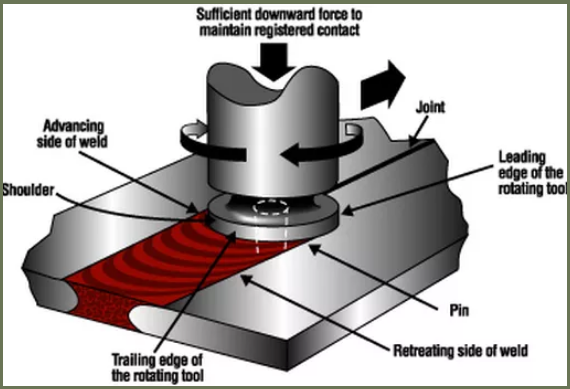Description of Friction Stir Welds
Discover how our Friction Stir Welds can help your business
Friction Stir Welding (FSW) is a welding process that was invented by the Welding Institute in Cambridge, UK in 1991. It is one of the top developments in the last 30 years for large panel fabrication, particularly in shipbuilding aluminum construction. It’s a simple process in theory, but few companies have the extensive experience and large production capabilities needed to deliver high quality and low cost very large panels. It’s a large capital investment, particularly to use friction stir welding in shipbuilding where panels can be massive.
Friction stir welding is a process where a machine rotates, plunges, and then moves a special shaped FSW tool along a joint to form a weld. The rotating action of the FSW tool generates friction to plasticize the metal with the heat generated and the rotation also provides the mixing necessary to transport weld joint material from one side of the joint line to the other.
FSW Provides Cleaner and Stonger Welds
The FSW delivers numerous advantages over other welding technologies. It is used to weld a wide range of materials including aluminum, steel, plastic, titanium, copper, and magnesium. Butt and lap joints are the most common types of welds for FSW and also the simplest. Bayou also does FSW Spot Welding in some applications. A key advantage is that less surface preparation is needed but it’s vitally important to hold the plates tightly in place. The machinery for that is a critical part of the process. Fillet welds can also be done with FSW and it’s excellent at joining dissimilar metals, with proper engineering weld design to get the right setup.
FSW advantages over traditional welding processes include:
- Improved ductility, fatigue and fracture toughness
- High yield strength (up to 80% of base metal) in large aluminum panels. In testing, failures are often in the base material first.
- Fatigue life of friction is greatly improved over laser and MIG welding.
- Fracture toughness is also higher.
- Corrosion resistance is also very good.
- The application to LARGE aluminum panels offers tremendous cost advantages in the manufacturing, particularly for very long panels. (Our Bayou FSW line is almost 200 ft long.)
- Lower temperatures of FSW are an advantage for welding thick aluminum skins of honeycomb panels.
- Dissimilar material welds can be made successfully, with solid engineering design before welding.
- No consumables, the tool is non-consumable. This is significantly more environmentally friendly.
- Extremely high quality, low defect bonds
- Minimum distortion of the joined parts
Friction Stir Welding is Preferred in a Wide Variety of Market Sectors
The friction stir welding process is being used within the aerospace, military vehicle, aircraft, automotive, shipbuilding, railway rolling stock industries, and a growing list of other applications.
The other two basic configurations for friction welding are:
Rotary Friction Welding
This is a very popular type of friction welding. At least one of the parts is rotationally symmetrical, usually a tube or bar.
Linear Friction Welding
A more advanced technique for engine components, near-net manufacturing
- Affords new joining applications for difficult manufacturing challenges- from extrusions to sheets and more
- Virtually defect-free bonding
- Accommodates parts up to 55 feet long
- Ability to join dissimilar alloys
- Ability to use dual head feature for fast panel welding
- Minimal distortion of joined parts, for extremely high-weld strength
- Eco-friendly since no consumables are used
- For aluminum particularly, lower distortion is created with the lower heat, and porosity problems associated with aluminum arc welding are eliminated.
Friction Stir Welding Industries Include:
Shipbuilding
Aerospace
Electronics
Marine
Military
Transportation
The Friction Stir Welding Experience and Knowledge You Need
One limitation that can affect quality and speed of FSW welding projects is the mechanical stability of the tool while welding. The tool both heats the substrate metal and also provides the mechanical stirring action for the weld. It sees extremely high mechanical loads and thermal stress and has to work for long periods without wear or any dimensional change. The design of the tools and the whole setup is critical. Bayou Manufacturing has years of FSW experience and an engineering staff knowledgeable in FSW setup for a wide range of materials and configurations.
Aluminum welding, which Bayou specializes in, is one of the most important materials for friction stir welding because of the lower temperatures involved and the ability to manufacture extremely long panels for shipbuilding. Almost all classes of aluminum have been successfully friction stir welded, including the newest Al-Li alloys.
Some Interesting Applications of Friction Stir Welding
Shipbuilding
Early application involved welding hollow aluminum panels for fishing boats. Today, this welding technique is used extensively in all sizes of aluminum boat and ship construction. The major advantage in shipbuilding is that the minimum aluminum panel distortion of FSW means they hold their shape even in extremely long welds.
Aerospace
Aluminum cryogenic oxygen fuel tanks are fabricated using FSW to weld the domes to the cylindrical tank structure. This highlights the quality requirement for the FSW weld which is extremely high. As far back as 1999,
Railroad
High speed train manufacturing, like the aerospace industry, puts a premium on light weight and high strength. Friction stir welding finds its use on hollow profiles and T-stiffener extrusions for manufacturing high-speed trains.
Automotive Industry
Aluminum as a structural material in the automotive industry has grown in recent years with manufacturers using it more in car chassis. FSW is the preferred method for welding these chassis in many cases because of the high tolerance parts possible. Cost and quality are also a strong reason more FSW is being employed in automotive manufacturing.


 MFG in USA
MFG in USA